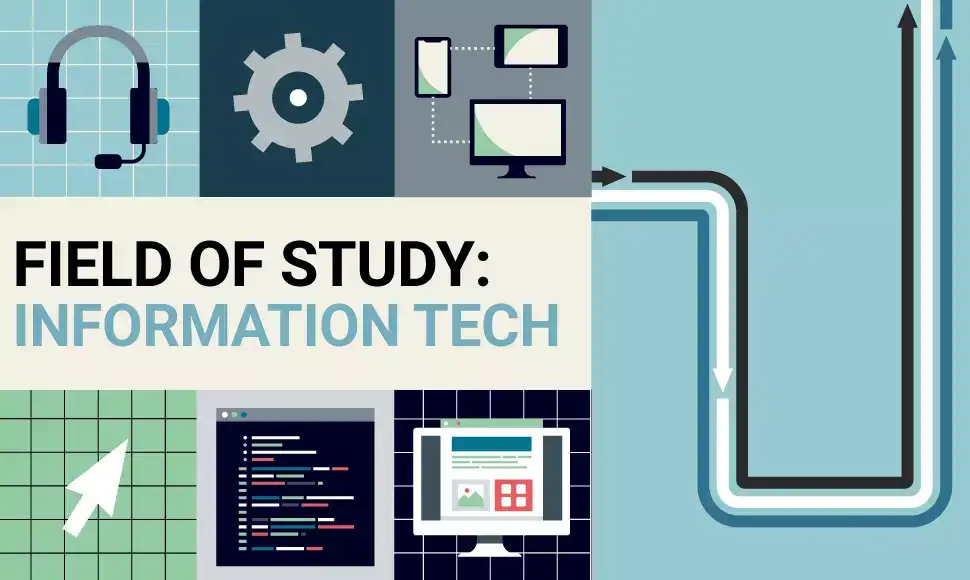In an Information Technology (IT) degree, you'll dive deep into the core elements that drive the tech world. You'll explore subjects that equip you with the vitals required in today's digital landscape.
From programming to network management, expect a blend of foundational courses and advanced topics to get you industry-ready.

What is an Information Technology Degree and what is useful for?
An Information Technology (IT) degree is an academic program focused on the study of computers and telecommunications in order to process, store, and transmit data.
Provides a comprehensive understanding of how computer-based systems function, both on the software and hardware side. It emphasizes the practical application of technology in various domains.
It equips you with the knowledge to design, develop, and manage hardware, software, and network systems. This degree is useful for pursuing careers in areas like:
- Software Developer
- Systems Analyst
- Network Administrator
- IT Consultant
- Cybersecurity Specialist
- Database Administrator
- IT Project Manager
- Web Developer
- Data Scientist
- Cloud Solutions Architect
You can obtain an Information Technology (IT) degree from a wide range of institutions. This includes universities, colleges, and online education platforms.
Many well-known universities offer IT degree programs. Some renowned ones include MIT, Stanford University, Carnegie Mellon University, and the University of California, Berkeley, among others.
Additionally, there are numerous online platforms like Coursera, edX, and Udacity that offer IT-related courses and even full degree programs in partnership with universities.
Fundamental Courses in Information Technology
Fundamental courses in an Information Technology (IT) degree typically include:
- Introduction to Computer Science: This course covers the basics of programming, algorithms, and problem-solving techniques using a programming language like Python or Java. It lays the foundation for software development.
- Computer Architecture and Organization: This course delves into the inner workings of computer hardware, including CPUs, memory, and storage systems. It helps you understand how computers execute instructions.
- Data Structures and Algorithms: This course explores fundamental data structures (e.g., arrays, linked lists, trees) and algorithms (e.g., sorting, searching) used in software development. It's essential for efficient coding.
- Operating Systems: This course focuses on the principles of operating systems, including process management, memory management, file systems, and virtualization. You learn how software interacts with hardware.
- Database Management: It covers database design, implementation, and management. You'll learn about SQL, database normalization, and data modeling. This knowledge is crucial for handling data.
- Networking Fundamentals: This course introduces the basics of computer networks, including protocols, network topologies, and network security. You'll learn how data is transmitted and secured over networks.
- Web Development: This course covers web technologies, including HTML, CSS, JavaScript, and server-side scripting languages like PHP or Node.js. You'll create web applications and understand client-server interactions.
- Cybersecurity: This course addresses the principles of cybersecurity, including threat detection, risk management, encryption, and ethical hacking. It's vital for protecting computer systems.
- Software Engineering: Software engineering focuses on the systematic development of software, including requirements analysis, design, coding, testing, and maintenance. It emphasizes best practices for software development.
- IT Project Management: This course teaches project management methodologies and tools specific to IT projects. You'll learn to plan, execute, and manage IT projects effectively.

Advanced Courses in Information Technology
Advanced courses in an Information Technology (IT) degree program build upon the foundational knowledge gained in the earlier courses:
- Advanced Programming and Software Development: This course delves deeper into software development methodologies, advanced programming languages, and complex coding projects. Students may work on larger-scale software applications.
- Advanced Database Management: Advanced topics in database management involve database optimization, distributed databases, and NoSQL databases. Students learn to design and manage complex database systems.
- Computer Networks and Security: This course explores advanced networking concepts, including network design, protocols, and security mechanisms. It may cover topics like virtualization, cloud networking, and advanced cybersecurity strategies.
- Machine Learning and Artificial Intelligence: Students delve into the principles of machine learning and AI, including neural networks, deep learning, and natural language processing. They may work on AI projects and data analysis.
- Cloud Computing and Virtualization: Advanced cloud computing courses cover cloud architecture, deployment models, and cloud security. Students may gain hands-on experience with cloud platforms like AWS, Azure, or Google Cloud.
- Big Data Analytics: This course focuses on processing and analyzing large datasets using tools like Hadoop and Spark. Students learn about data mining, predictive modeling, and data visualization.
- IT Governance and Compliance: This course explores IT governance frameworks, compliance regulations, and risk management in IT. It's essential for understanding legal and ethical considerations in technology.
- Web Security and Penetration Testing: This course hones in on web security, covering topics like web application vulnerabilities, ethical hacking, and penetration testing. Students learn to identify and fix security weaknesses.
- Mobile App Development: Advanced mobile app development courses focus on creating complex and feature-rich mobile applications for different platforms, such as iOS and Android.
- Enterprise IT Solutions: This course addresses IT solutions for large organizations, including enterprise architecture, ERP systems, and IT service management.
- IoT (Internet of Things) and Embedded Systems: Students explore the world of IoT and embedded systems, learning to design and develop devices connected to the Internet.
- Digital Forensics: This course covers the investigation of digital crimes and data breaches, including data recovery, evidence preservation, and forensic analysis.
How to gestion these courses to obtain a degree?
Choose the IT degree program that aligns with your career goals and interests. Consider factors like program duration, specialization options, and delivery format (on-campus or online).
Obtain a copy of your program's curriculum or course catalog to understand the required courses, prerequisites, and elective options. Start with core courses that are prerequisites for advanced ones.
Choose electives and specializations that align with your career interests. Research these options thoroughly to make informed decisions.
Keep a close eye on your degree requirements and make sure you meet all prerequisites and credit-hour requirements for graduation.
Conclusion
An Information Technology (IT) degree typically consists of a combination of fundamental and advanced courses.
Fundamental courses provide a strong foundation in areas such as computer science, networking, database management, cybersecurity, and web development.







